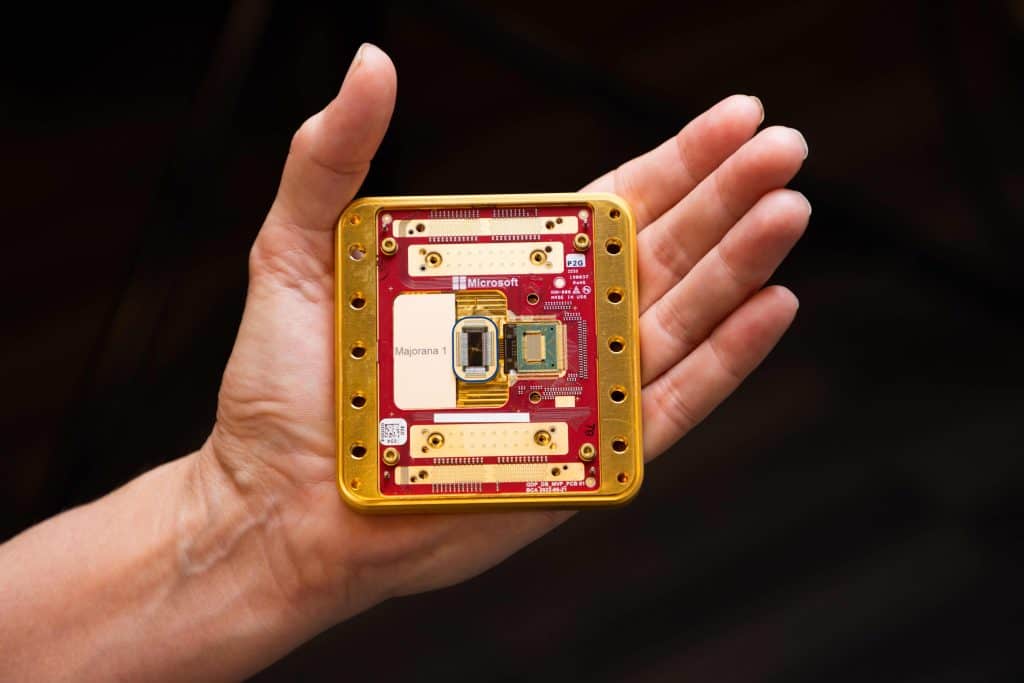
Microsoft on Wednesday announced Majorana 1, its first quantum computing chip.
The achievement comes after the company spent nearly two decades of research in the field, but Microsoft claims that building Majorana 1 required that it create an entirely new state of matter, which it is referring to as a topological state.
Microsoft’s quantum chip employs eight topological qubits using indium arsenide, which is a semiconductor, and aluminum, which is a superconductor.
“The difficulty of developing the right materials to create the exotic particles and their associated topological state of matter is why most quantum efforts have focused on other kinds of qubits,” the company said in a blog Wednesday.
Understanding topological matter and getting it to work in building a quantum-computing chip required that Microsoft spray atom by atom to get the materials to line up perfectly, the company wrote in the blog.
“Ironically, it’s also why we need a quantum computer — because understanding these materials is incredibly hard,” said Krysta Svore, Microsoft technical fellow, in the blog. “With a scaled quantum computer, we will be able to predict materials with even better properties for building the next generation of quantum computers beyond scale.”
A new paper in the journal Nature describes the chip in detail.
Technologists believe quantum computers could one day efficiently solve problems that would be taxing if not impossible for classical computers. Today’s computers use bits that can be either on or off while quantum computers employ quantum bits, or qubits, that can operate in both states simultaneously.
Google and IBM have also developed quantum processors, as have smaller companies IonQand Rigetti Computing.
Microsoft won’t be allowing clients to use its Majorana 1 chip through the company’s Azure public cloud, as it plans to do with its custom artificial intelligence chip, Maia 100. Instead, Majorana 1 is a step toward a goal of a million qubits on a chip, following extensive physics research.
Rather than rely on Taiwan Semiconductor or another company for fabrication, Microsoft is manufacturing the components of Majorana 1 itself in the U.S. That’s possible because the work is unfolding at a small scale.
“We want to get to a few hundred qubits before we start talking about commercial reliability,” Jason Zander, a Microsoft executive vice president, told CNBC.
In the meantime, the company will engage with national laboratories and universities on research using Majorana 1.
Despite the focus on research, investors are fascinated by quantum.
IonQ shares went up 237% in 2024, and Rigetti gained nearly 1,500%. The two generated a combined $14.8 million in third-quarter revenue. Further gains came in January, after Microsoft issued a blog post declaring that 2025 is “the year to become quantum-ready.”
Microsoft’s Azure Quantum cloud service, which lets developers experiment with programs and algorithms, offers access to chips from IonQ and Rigetti. It’s possible that a Microsoft quantum chip might become available through Azure before 2030, Zander said.
“There’s a lot of speculation that we’re decades off from this,” he said. “We believe it’s more like years.”
Rather than exist as a stand-alone category, quantum computing might end up boosting other parts of Microsoft. For example, there’s Microsoft’s AI business, which has an annualized revenue run rate that exceeds $13 billion. Quantum computers could be used to build data used to train AI models, Zander said.
“Now you can ask it to invent some new molecule, invent some new drug,























